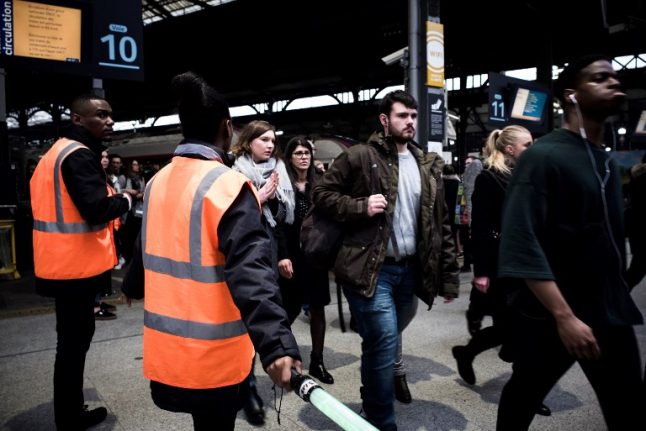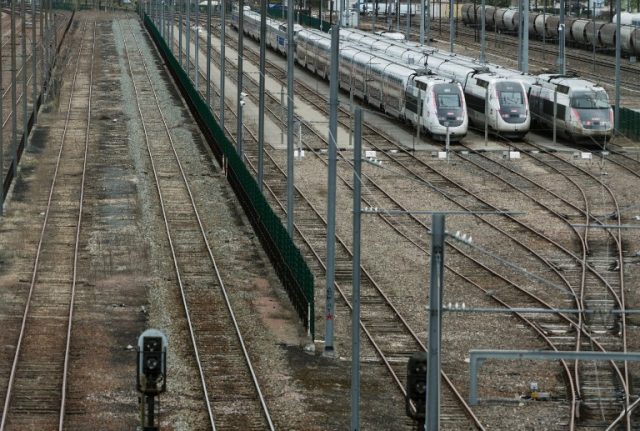French rail passengers were hit by a sixth day of strikes on Friday, with the national rail operator SNCF urging people to postpone travel plans and to stay away from train stations if possible.
Only one in five high-speed TGV trains will run, as well as one in five trains on main lines, with two out of three regional trains operating, including in the Paris region, the SCNF said.
The Eurostar trains under the Channel will run as normal, and the Thalys linking Paris with Brussels will be ‘almost normal’, the company said.
Train traffic will also be disrupted on Saturday but will return to normal on Sunday until the next planned strike day on April 18.
In Paris, the Metro and buses will be working as normal, but the RER services linking the capital to its suburbs will be disrupted from Thursday evening:
- On the RER A, 1 out of 2 trains will run on the Cergy-Poissy line on Friday.
- On the RER B Nord, 3 out of 5 trains will run on Friday with no connection at the Gare du Nord.
- On the RER C, 1 out of 4 trains will run on Thursday evening and 2 out of 3 on Friday.
- On the RER D, 1 out of 3 trains will run on Thursday evening and 3 out of 5 on Friday with no connections at the Gare du Nord and Gare de Lyon.
- On the RER E, 1 out of 3 trains will run on Thursday evening and 2 out of 3 on Friday.

These disruptions are the latest of three months of rolling strikes planned by rail workers that began on April 3 over plans to overhaul the heavily indebted train operator SNCF, the biggest test yet to President Emmanuel Macron's wide-ranging drive to reform the country's economy.
The strikes have caused major travel headaches for the 4.5 million daily rail users in France.
In a television interview on Thursday, the French president who had hardly spoken about the conflict publicly, vowed to stand firm. “I will go to the end of these reforms,” he said. “It is essential we go ahead, not to do so would be a political hypocrisy”.
“I believe, as the unions do, that we need a strong rail service, a strong SNCF, and I respect their struggle,” Macron told TF1 television in his first comments on the rolling strikes launched last week.
“But I'm also asking them to fully consider the needs of our fellow citizens who have to put up with this, of the companies that could fail because of this strike,” Macron said.
“The right answer is not to abandon this reform, but to carry it out together,” he said.
“But I am going to see this through to the end.”
Public opinion appears to be swinging towards the government, with an Ifop poll published last weekend showing 62 percent in favour of the SNCF reform.
It was an increase of 11 percentage points from Ifop's survey on March 30-31, in which just 51 percent supported the reform.
At stake is the government's plan to deny a guaranteed job for life and early pensions to new hires, which it says is necessary for improving the SNCF's flexibility and cutting costs.
The company has some 47 billion euros in legacy debt, part of which the government may absorb as part of the overhaul, ahead of opening up European passenger rail traffic to competition starting from 2020.
Workers also fear that if rivals take over lines previously operated by the SNCF, they will lose their job security and other benefits.
Rail unions are hoping to take advantage of a growing atmosphere of social discontent against Macron's reforms, including protests and strikes by civil servants, energy workers and garbage collectors.
Employees at Air France, in which the government holds a minority stake, also went on strike again on Wednesday seeking a six percent pay raise, and students have been blocking several public universities over Macron's plan to introduce more selective applications.
Macron, who again told of his own grandfather's job as a rail worker, said he understood the often difficult hours and constraints for SNCF employees.
But he said the company needed more flexibility for organising its operations ahead of the looming opening of the European passenger rail market
to competition starting in 2020.
“This SNCF can't work if I tell 25-year-olds today that 'You'll be hired under the same terms as my grandfather' — because that's basically what we're
telling them. It's not workable,” Macron said.
“In Germany they made more or less the same reform. And look at what happened: better service, more people taking the train, and more regional
lines,” he said, accusing unions of trying to scare people by saying some loss-making regional lines could be closed.



 Photo: AFP
Photo: AFP Please whitelist us to continue reading.
Please whitelist us to continue reading.